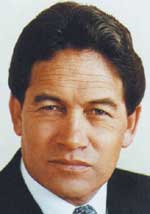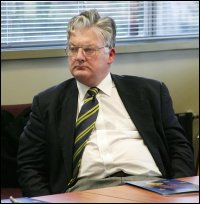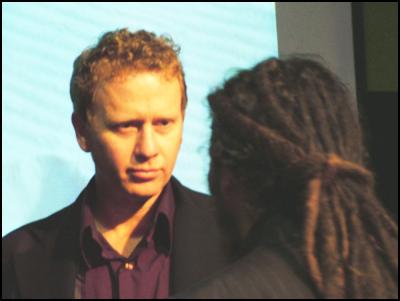Three of the eight parties in Parliament exist because of three men – Winston Peters, Peter Dunne and Jim Anderton. They are all of a similar generation, and all of them should retire in 2008. The parties they lead are, by and large, built around those personalities. Most would struggle to name more than 1 other MP from NZ First, United Future and, well, Jim Anderton’s Progressive Party is just that. All had political careers because they were MPs with either National or Labour and split off to form their own parties (Jim Anderton has been in three, Peter Dunne in three or four, Winston has always had his own personality cult) – and it is about time Parliament was cleaned out and these half-baked parties of individuals were gone.
.
Winston is losing the plot, he is propping up a lameduck Labour government that is barely hanging onto power, he lost his electorate seat, and only manages to get elected because the greedy grey grizzlers, the deluded Maori groupies and the conspiracy slobbering talk back idiots like him, until he gets into power. The greedy grey grizzlers are slowly dying off, and by 2008 should mean NZ First gets less than 5%. Meanwhile, Winston can enjoy his baubles. He left National for principled reasons - it broke election promises - but he ran a party that is solely about tapping into the redneck conservative anti-intellectual talkback mob, Rob Muldoon's lot. The people of Tauranga have tired of their former hero, he wont be the first Maori Prime Minister of New Zealand - and he ought to go off and have fun in retirement.
back idiots like him, until he gets into power. The greedy grey grizzlers are slowly dying off, and by 2008 should mean NZ First gets less than 5%. Meanwhile, Winston can enjoy his baubles. He left National for principled reasons - it broke election promises - but he ran a party that is solely about tapping into the redneck conservative anti-intellectual talkback mob, Rob Muldoon's lot. The people of Tauranga have tired of their former hero, he wont be the first Maori Prime Minister of New Zealand - and he ought to go off and have fun in retirement.
Peter Dunne leads a motley bunch of conservative liberal Christian urban power lusting middle of the road nobodies. His party has been Labour’s most faithful coalition/confidence and supply partner now since 2002, and besides voting against any socially liberal legislation (but keeping Labour in power), worshipping the Transmission Gully cargo cult and cozying up to the Christian right, it is a party that is meaningless. It is a tes tament to Labour that it can even look at this bigoted bunch of narrow-minded busybodies to stay in power, and a testament to United Future that it hooks up with Labour – regularly. Peter Dunne’s Ohariu-Belmont electorate love him, for some unfathomable reason (he hangs around there a lot). When he retires this will become a swing seat, going National/Labour according to the national mood. Peter Dunne left Labour because "Labour left him", which is true. The Maoist coup conducted by Helen Clark, Maryanne Street and Heather Simpson against Mike Moore, and the leftward swing of Labour alienated Dunne, and he tried to woo the Labour right to form a centrist coalition partner for National and Labour. That failed miserably, and so he wooed the Christian right, and alienated the centre. The Christian right went National last time - Peter Dunne ought to cut his losses and move up to Kapiti, where he can sit waiting for Transmission Gully for at least the next ten years.
tament to Labour that it can even look at this bigoted bunch of narrow-minded busybodies to stay in power, and a testament to United Future that it hooks up with Labour – regularly. Peter Dunne’s Ohariu-Belmont electorate love him, for some unfathomable reason (he hangs around there a lot). When he retires this will become a swing seat, going National/Labour according to the national mood. Peter Dunne left Labour because "Labour left him", which is true. The Maoist coup conducted by Helen Clark, Maryanne Street and Heather Simpson against Mike Moore, and the leftward swing of Labour alienated Dunne, and he tried to woo the Labour right to form a centrist coalition partner for National and Labour. That failed miserably, and so he wooed the Christian right, and alienated the centre. The Christian right went National last time - Peter Dunne ought to cut his losses and move up to Kapiti, where he can sit waiting for Transmission Gully for at least the next ten years.
.
Winston is losing the plot, he is propping up a lameduck Labour government that is barely hanging onto power, he lost his electorate seat, and only manages to get elected because the greedy grey grizzlers, the deluded Maori groupies and the conspiracy slobbering talk
 back idiots like him, until he gets into power. The greedy grey grizzlers are slowly dying off, and by 2008 should mean NZ First gets less than 5%. Meanwhile, Winston can enjoy his baubles. He left National for principled reasons - it broke election promises - but he ran a party that is solely about tapping into the redneck conservative anti-intellectual talkback mob, Rob Muldoon's lot. The people of Tauranga have tired of their former hero, he wont be the first Maori Prime Minister of New Zealand - and he ought to go off and have fun in retirement.
back idiots like him, until he gets into power. The greedy grey grizzlers are slowly dying off, and by 2008 should mean NZ First gets less than 5%. Meanwhile, Winston can enjoy his baubles. He left National for principled reasons - it broke election promises - but he ran a party that is solely about tapping into the redneck conservative anti-intellectual talkback mob, Rob Muldoon's lot. The people of Tauranga have tired of their former hero, he wont be the first Maori Prime Minister of New Zealand - and he ought to go off and have fun in retirement.Peter Dunne leads a motley bunch of conservative liberal Christian urban power lusting middle of the road nobodies. His party has been Labour’s most faithful coalition/confidence and supply partner now since 2002, and besides voting against any socially liberal legislation (but keeping Labour in power), worshipping the Transmission Gully cargo cult and cozying up to the Christian right, it is a party that is meaningless. It is a tes
 tament to Labour that it can even look at this bigoted bunch of narrow-minded busybodies to stay in power, and a testament to United Future that it hooks up with Labour – regularly. Peter Dunne’s Ohariu-Belmont electorate love him, for some unfathomable reason (he hangs around there a lot). When he retires this will become a swing seat, going National/Labour according to the national mood. Peter Dunne left Labour because "Labour left him", which is true. The Maoist coup conducted by Helen Clark, Maryanne Street and Heather Simpson against Mike Moore, and the leftward swing of Labour alienated Dunne, and he tried to woo the Labour right to form a centrist coalition partner for National and Labour. That failed miserably, and so he wooed the Christian right, and alienated the centre. The Christian right went National last time - Peter Dunne ought to cut his losses and move up to Kapiti, where he can sit waiting for Transmission Gully for at least the next ten years.
tament to Labour that it can even look at this bigoted bunch of narrow-minded busybodies to stay in power, and a testament to United Future that it hooks up with Labour – regularly. Peter Dunne’s Ohariu-Belmont electorate love him, for some unfathomable reason (he hangs around there a lot). When he retires this will become a swing seat, going National/Labour according to the national mood. Peter Dunne left Labour because "Labour left him", which is true. The Maoist coup conducted by Helen Clark, Maryanne Street and Heather Simpson against Mike Moore, and the leftward swing of Labour alienated Dunne, and he tried to woo the Labour right to form a centrist coalition partner for National and Labour. That failed miserably, and so he wooed the Christian right, and alienated the centre. The Christian right went National last time - Peter Dunne ought to cut his losses and move up to Kapiti, where he can sit waiting for Transmission Gully for at least the next ten years..
Jim Anderton is a died in the wool socialist and central planner, who has enjoyed dishing out millions of your money to businesses and mad schemes like a strategy to bolster the forestry sector in Gisborne/Wairoa. Jim thought thousands of jobs would be created by pouring millions into roads and training in those districts – and nothing much has come of it. He has become more sensible over the years, Cabinet has helped to moderate his mad views on economics, and he basically is an appendage of Labour, while having old fashioned conservative leftwing views on social issues like drugs and alcohol. Once he retires, his Wigram seat will go back to Labour. His party will fade away even more than the Alliance, which still stands for something (which doesn’t even exist in eastern Europe anymore). New Labour and the Alliance are history, as Labour has marched sufficiently to the left to make enough voters happy, without being the card carrying socialists of the Norman Kirk variety that old Labour supporters wanted. Time magazine was wrong - Jim Anderton wont be Prime Minister. Jim Anderton and his family have paid a high personal price for his busy career, and he doesn't need the income of a Cabinet Minister to survive - time for
the forestry sector in Gisborne/Wairoa. Jim thought thousands of jobs would be created by pouring millions into roads and training in those districts – and nothing much has come of it. He has become more sensible over the years, Cabinet has helped to moderate his mad views on economics, and he basically is an appendage of Labour, while having old fashioned conservative leftwing views on social issues like drugs and alcohol. Once he retires, his Wigram seat will go back to Labour. His party will fade away even more than the Alliance, which still stands for something (which doesn’t even exist in eastern Europe anymore). New Labour and the Alliance are history, as Labour has marched sufficiently to the left to make enough voters happy, without being the card carrying socialists of the Norman Kirk variety that old Labour supporters wanted. Time magazine was wrong - Jim Anderton wont be Prime Minister. Jim Anderton and his family have paid a high personal price for his busy career, and he doesn't need the income of a Cabinet Minister to survive - time for
.
Jim Anderton is a died in the wool socialist and central planner, who has enjoyed dishing out millions of your money to businesses and mad schemes like a strategy to bolster
 the forestry sector in Gisborne/Wairoa. Jim thought thousands of jobs would be created by pouring millions into roads and training in those districts – and nothing much has come of it. He has become more sensible over the years, Cabinet has helped to moderate his mad views on economics, and he basically is an appendage of Labour, while having old fashioned conservative leftwing views on social issues like drugs and alcohol. Once he retires, his Wigram seat will go back to Labour. His party will fade away even more than the Alliance, which still stands for something (which doesn’t even exist in eastern Europe anymore). New Labour and the Alliance are history, as Labour has marched sufficiently to the left to make enough voters happy, without being the card carrying socialists of the Norman Kirk variety that old Labour supporters wanted. Time magazine was wrong - Jim Anderton wont be Prime Minister. Jim Anderton and his family have paid a high personal price for his busy career, and he doesn't need the income of a Cabinet Minister to survive - time for
the forestry sector in Gisborne/Wairoa. Jim thought thousands of jobs would be created by pouring millions into roads and training in those districts – and nothing much has come of it. He has become more sensible over the years, Cabinet has helped to moderate his mad views on economics, and he basically is an appendage of Labour, while having old fashioned conservative leftwing views on social issues like drugs and alcohol. Once he retires, his Wigram seat will go back to Labour. His party will fade away even more than the Alliance, which still stands for something (which doesn’t even exist in eastern Europe anymore). New Labour and the Alliance are history, as Labour has marched sufficiently to the left to make enough voters happy, without being the card carrying socialists of the Norman Kirk variety that old Labour supporters wanted. Time magazine was wrong - Jim Anderton wont be Prime Minister. Jim Anderton and his family have paid a high personal price for his busy career, and he doesn't need the income of a Cabinet Minister to survive - time for.
So I want all three to go, and their parties from Parliament. It would clear out some history and some parties that don't really stand for much at all. NZ First stands for populist nationalism, but sways and swings according to how Winston thinks the grass the growing. United Future stands for nothing at all, as long as it is about families and commonsense, and has undercurrents of stopping all those queers from running things, and Jim Anderton is a virtual member of the Labour Party.
.
Oh and will the end of those parties make it harder for Labour or National to govern, losing these three potential coalition partners? Of course it does – it means Labour is forced to resort to the Greens and Maori party, and National resorts to ACT. National might worry, but then it never really understood MMP as well as Labour has. Its strategy of decimating ACT demonstrates that. Then the minor parties in Parliament will be ones that actually subscribe to different political ideologies - ecological socialism, ethno-nationalism and neo-liberalism.
Oh and will the end of those parties make it harder for Labour or National to govern, losing these three potential coalition partners? Of course it does – it means Labour is forced to resort to the Greens and Maori party, and National resorts to ACT. National might worry, but then it never really understood MMP as well as Labour has. Its strategy of decimating ACT demonstrates that. Then the minor parties in Parliament will be ones that actually subscribe to different political ideologies - ecological socialism, ethno-nationalism and neo-liberalism.


